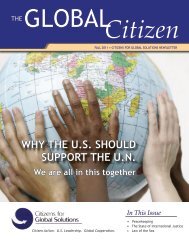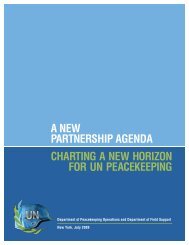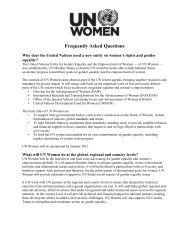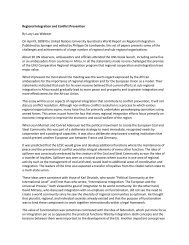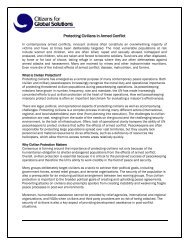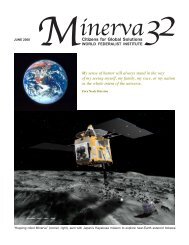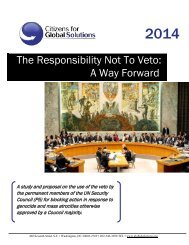Minerva, Fall 2011 - Citizens for Global Solutions
Minerva, Fall 2011 - Citizens for Global Solutions
Minerva, Fall 2011 - Citizens for Global Solutions
- No tags were found...
You also want an ePaper? Increase the reach of your titles
YUMPU automatically turns print PDFs into web optimized ePapers that Google loves.
actually closer to being #10 (social mobility)or maybe #34 (infant mortality)or dead last — pun intended — in thepercentage of our population we incarcerate”.He angrily challenges “the complainerswho deny the public good andinsist government is a wastrel” to “makeup their minds: do they want the UnitedStates to be a third class mini-state with afourth class public sector? In which casethey can … stop pretending we’re numberone and admit we’re actually a drop-out.Or they can try to give some substance totheir boasting and take steps to maintainour global leadership. In which case theyneed to be revitalizing and growing thepublic sector they are currently devastating.”Instead of hypocritically destroyingdemocratic governance, he argues,we need to learn to “share our commonwealth”and enable farsighted leadershiptoward that end. Unless we’re intent onstaggering backward while shoutinglouder about being number one. 7While Barber was calling <strong>for</strong> “salvagingAmerican leadership at home andabroad” last summer (“We’re Number34!”), Steve Clemons was blogging 8 froma conference in Aix-en-Provence, organizedby Le Cercle des Economistes tograpple with “The State of the World”. In“a session exploring the growing tensionbetween political rather than economiczones and whether ‘states’ were back orstill getting fuzzed up by various transnationalsaboteurs”, his New America Foundationcolleague Parag Khanna 9 “said thatglobalization is not a trend that can justbe quickly turned on and off. He thinksglobalization is a much longer, deeperprocess stretching back a thousand yearsin which the Silk Road was an early partof the plat<strong>for</strong>m. Khanna said we are ‘nowentering a phase in which globalization isreally global’ and that it can’t be slowedby the fiscal straits of a few of the largerdeveloped countries. … [He] also saidthat nation states as the term of unit inthe international system was being underminedby ‘Four C’s’ -- Countries, Cities,Companies, and Communities. Hebelieves that these groupings will shareauthorities, overlap, and intensify theircommunication and coordination in waysthat don’t depend on the state <strong>for</strong> intermediation.”10 These shifts are exposinglimits of patchwork international law aswell as of national prerogatives.commonwealWhile people continue, deliberately and/or by default, to sort out Khanna’s crisscrossed“Four C” categories and <strong>for</strong>mteams from them, vast exigencies pressureus all, threatening our lifesaving sense ofa 5th C: the Commonweal. Rescuing thismay require some rehabilitation of bodiespolitic, large and small — identifyingessential values, acknowledging sharedrights and responsibilities, and poolingsovereignty <strong>for</strong> the sake of better selfgovernmentat all levels.The holes in this early 21st-century 5th C,the Commonweal, are lined with mindbogglingnumbers: the bewildering calculationsof the financial & economiccrisis; the alarming statistics of populationgrowth, disappearing species, andclimate change; the staggering numbersof migrants, asylum-seekers, camp-boundrefugees, slum dwellers, child soldiers,victims of famines, disease, disasters,ethnic cleansing, crimes against humanity,war crimes, and genocide. And, lurkinganywhere, even where least expected(as in Norway) the “one of us” — eachunaccounted <strong>for</strong>, in numbers and linkagesunknown — who can go rogue to maimand kill in the grip of an extreme ideologyor misunderstanding or perverse impulse.scrimmageThough feeling overrun and nearly overwhelmedby the piling on of these numbers,we have realized that we have tostart somewhere to interrupt their patterns— such as committing to the MillenniumDevelopment Goals (MDGs) 11 , the InternationalCriminal Court (ICC), the principleof the Responsibility to Protect (R2P),an Arms Trade Treaty (ATT) to reducethe supply of small arms to human rightsabusers, and the proposed UN EmergencyPeace Service (UNEPS), designed tocomplement existing peace operations— even though all of these measures arediscouragingly clumsy at this early stage,without having all the necessary equipment,and without our having learned allthe necessary implementing skills yet.4 • <strong>Minerva</strong> #39 • November <strong>2011</strong>As <strong>Citizens</strong> <strong>for</strong> <strong>Global</strong> <strong>Solutions</strong> CEODon Kraus points out, when stressing theneed <strong>for</strong> “a global 911 service that canrapidly, credibly and legitimately respondwhen a government uses its military toviolently smash peaceful protest” (UN-EPS) 12 , “you can’t protect babies from30,000 feet nor should this be the job ofthe US and its allies alone”. 13 Carrying thelatter proviso a step further, so that “militaryunits belonging to hegemonic powers— in particular, the United States andNATO — must not be allowed to participatein … intervention”, is one of WaldenBello’s five guidelines <strong>for</strong> considering alegitimate intervention (and only in “theexceptional case of genocide being carriedout by a government”) 14 . His first twocriteria, usually considered grimly late inan emergency, are that “the evidence <strong>for</strong>genocide must be substantial” and “theintervention must be a last resort, after allef<strong>for</strong>ts at stopping the genocide by diplomacy,military export bans, and economicsanctions have failed”. He scarcely mentionsthat the R2P principle also grappleswith thresholds and the right moment ofa last resort. Third, “the UN General Assembly,not the Western-dominated SecurityCouncil, must legitimize the intervention”.He does not specify whether thiswould be in the “Uniting <strong>for</strong> Peace” modeor require a different mechanism. Finally,“the expeditionary <strong>for</strong>ce must aim onlyat stopping the genocide, must withdrawonce the situation has stabilized, and mustrefrain from sponsoring and propping upan alternative government and engagingin ‘nation-building’.” Defining and securingthe stability is left an open question.Obviously, Walden Bello is discussingonly one kind of intervention. But hisopening sentence equates it with a narrownotion of R2P: “Events in Libya andSyria have again brought to the <strong>for</strong>efrontthe question of armed humanitarian interventionor the ‘responsibility to protect’.”And the scheme he outlines seemsstrangely sanitized. Atrocity reaches acalculable level, is duly stopped, and thescene magically clears itself. Instead,as Rachel Gerber observes, “Far from achecklist that mandates uni<strong>for</strong>m action,R2P is a dynamic policy framework thatis meant to twist, bend, and adapt as bestit can to the complex realities of the world



